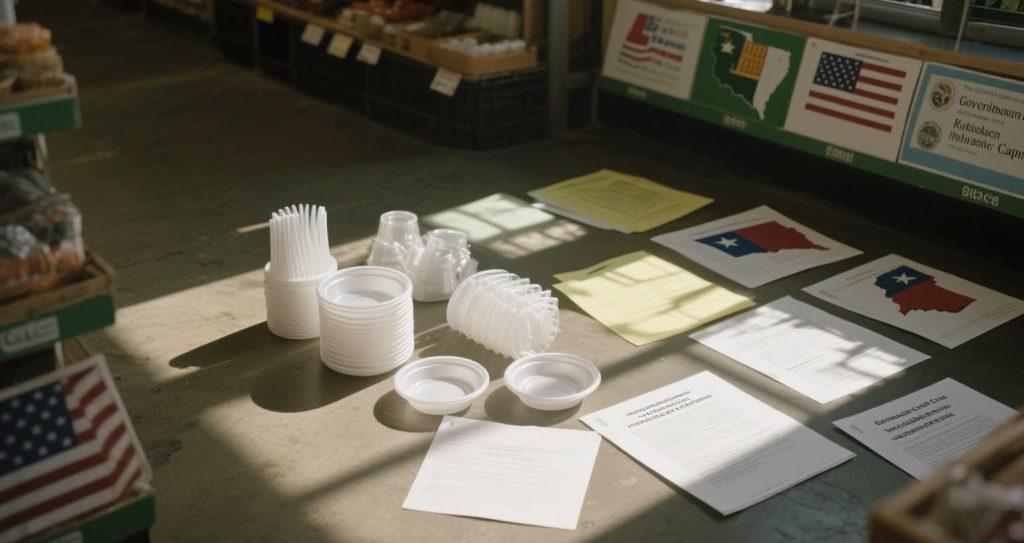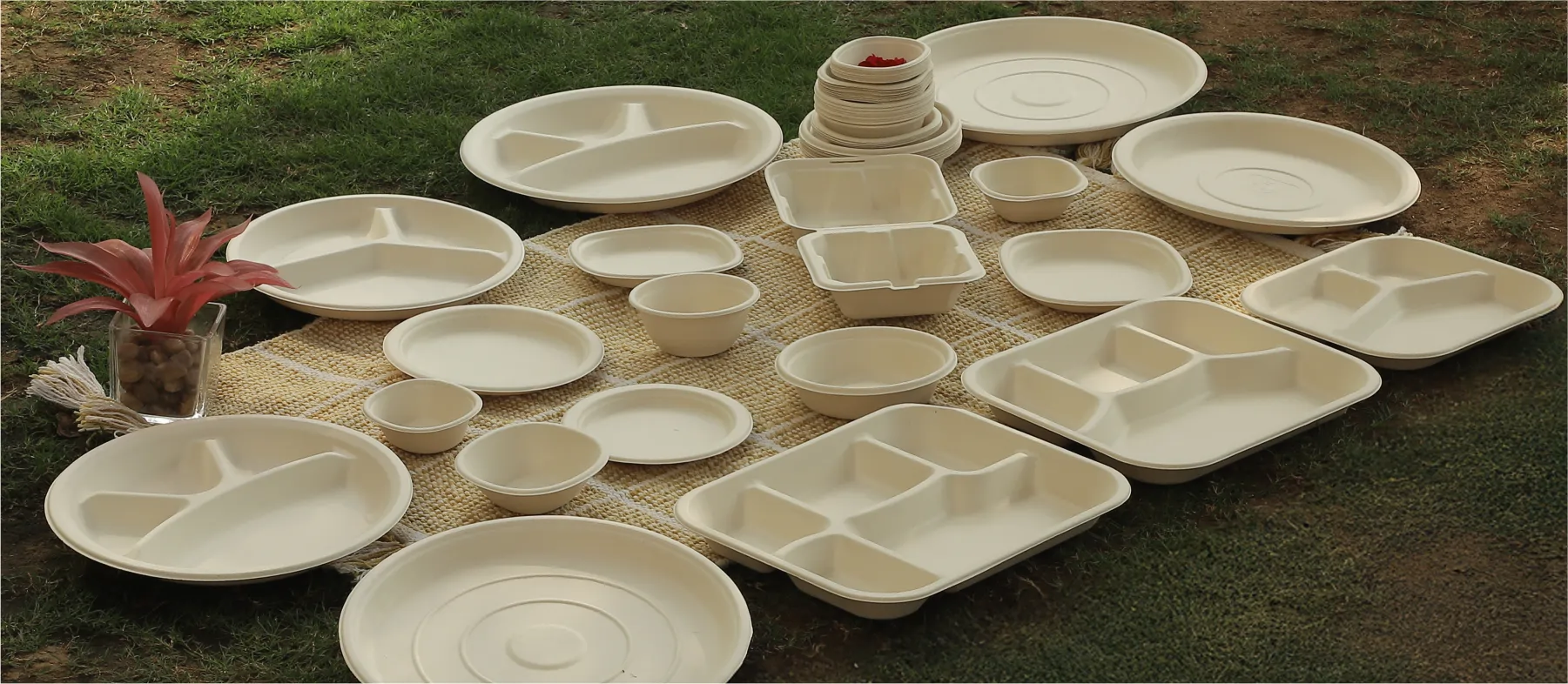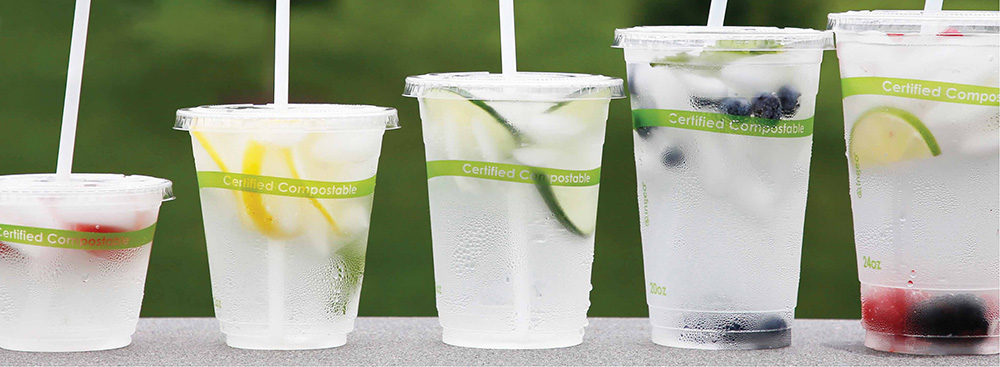Introduction
If you’re a food packaging exporter targeting the United States market, understanding the country’s fragmented but fast-evolving regulations on disposable plastic food packaging and tableware is not optional—it’s critical. While there’s no federal ban, state and local governments across the U.S. have enacted powerful laws banning or restricting single-use plastics, especially in the foodservice sector.
🧭 The U.S. Legal Landscape: 50 States, 50 Rules
The United States does not have a nationwide law banning disposable plastic packaging. Instead, individual states and even cities enforce their own regulations, creating a “regulatory patchwork” that varies by region.
This makes compliance complicated—but also opens opportunities for manufacturers who can offer sustainable, certified, and customisable alternatives.

📍 State-Level Hotspots: The Most Influential Markets
✅ California – The Most Progressive
- Bans EPS foam (expanded polystyrene) statewide.
- Enforces SB 54, requiring plastic packaging to include 30% recycled content by 2028.
- Restaurants must offer compostable or recyclable packaging for dine-in customers.
✅ New York – Focused on Waste Reduction
- EPS banned since 2022.
- NYC requires utensils and extras only upon request.
- Encourages compostable and recyclable materials across all boroughs.
✅ Washington – Strong on Compostables
- EPS foodware ban effective since June 2023.
- Packaging must be commercially compostable or recyclable.
✅ Vermont – Strictest in the East
- Bans plastic straws, stirrers, EPS, and non-recyclable utensils.
- Labels must clearly identify compostability or recyclability.
✅ Colorado & Oregon – Expanding Restrictions
- Prohibit plastic utensils and bags, with foam bans in effect.
- Offer tax incentives for businesses switching to green packaging.
🚫 What’s Being Banned or Restricted?
| Banned or Regulated Item | States Affected |
|---|---|
| EPS foam containers & cups | CA, NY, WA, VT, CO, MD, NJ, ME |
| Plastic straws & stirrers | CA, VT, OR, NY (request only), many cities |
| Non-compostable cutlery & lids | WA, VT, CA (varies by locality) |
| Non-recyclable food packaging | CA, WA, NYC, San Francisco |
| Packaging without recycled content | Mandated in CA (via SB 54) |
♻️ What Materials Are Safe and Preferred?
To export successfully, focus on these regulation-friendly materials:
- PLA (Polylactic Acid): Bioplastic made from corn starch. Compostable (ASTM D6400 certified), ideal for green states.
- Bagasse (Sugarcane Pulp): 100% compostable and biodegradable. Legal and widely accepted.
- RPET (Recycled PET): Popular for salad boxes and lids. Complies with California’s PCR requirements.
- PP (Polypropylene): Fully recyclable, microwave-safe, great for MAP (Modified Atmosphere Packaging).
- Paperboard with compostable lining: Used in cities requiring fiber-based packaging.

📊 Market Insight: Sustainability = Profitability
- According to NielsenIQ (2024), 62% of American consumers prefer eco-packaging, even at higher cost.
- Restaurants in California reported a 23% customer retention boost after switching to compostables.
- Retailers like Whole Foods and Trader Joe’s are pushing suppliers to phase out non-recyclables entirely.
🏭 Xiamen Dashan: Your Compliant & Competitive Packaging Partner
Xiamen Dashan helps importers and distributors across the U.S. meet packaging regulations with our full range of:
- ✅ PLA Cups & Dome Lids – Compostable and ASTM D6400-certified.
- ✅ RPET Salad Boxes & PET Drink Cups – With verified post-consumer content.
- ✅ PP Divided Lunch Boxes & MAP Trays – Recyclable, heat-resistant, food-safe.
- ✅ Custom Branding, FDA Compliance, SGS Reports, ISO Certification – All provided for export documentation.
Our team stays ahead of U.S. legal trends so you can focus on growth, not compliance headaches.
🌐 Visit:https://sc1137.searchtestsite.com/

❓ Frequently Asked Questions (FAQs)
Q1: Can I still export foam trays or cups to the U.S.?
A: Technically yes, but many U.S. distributors will not purchase them due to bans in major states like CA, NY, and WA.
Q2: What’s required for a PLA product to be accepted in the U.S.?
A: It must be certified under ASTM D6400 or D6868 and clearly labelled. Only accepted in areas with industrial composting.
Q3: Do I need FDA approval to export plastic packaging to the U.S.?
A: Yes, especially for food-contact materials. Packaging must comply with FDA 21 CFR standards.
Q4: What kind of documentation do U.S. buyers expect?
A: Certificates like FDA Letter of Guarantee, SGS Test Reports, Compostability Certification, and sometimes recycled content declarations.
Q5: What’s the safest choice for a variety of U.S. states?
A: RPET and PP offer the best coverage across bans, recyclability, and food safety. PLA is ideal for green markets but must be labelled carefully.
🧾 Conclusion: U.S. Regulations Are Complex—But Profitable for the Prepared
If you’re exporting disposable food packaging to the United States, regulatory awareness is not just a legal necessity, it’s a sales strategy. States like California and Washington are setting high standards—but also creating huge demand for compliant, sustainable alternatives.
Partnering with a certified, experienced manufacturer like Xiamen Dashan gives you a competitive edge in this fast-evolving market. From PLA to PP, from custom prints to compliance documents—we provide solutions that help you succeed legally and commercially.
📚 References
- California SB 54 Plastic Pollution Prevention and Packaging Producer Responsibility Act
https://calrecycle.ca.gov/packaging/statewide/ - New York State Department of Environmental Conservation: Foam Ban
https://www.dec.ny.gov/chemical/120762.html - Washington State Department of Ecology – Plastic Packaging Laws
https://ecology.wa.gov/Waste-Toxics/Reducing-recycling-waste/Plastic-laws - Vermont Agency of Natural Resources – Single-Use Product Law
https://dec.vermont.gov/waste-reduction/solid/single-use - Colorado General Assembly – House Bill 21-1162: Management of Plastic Products
https://leg.colorado.gov/bills/hb21-1162 - FDA – Packaging & Food Contact Substances (21 CFR Compliance)
https://www.fda.gov/food/packaging-food-contact-substances-fcs - ASTM International – D6400 Standard Specification for Compostable Plastics
https://www.astm.org/d6400-21.html - NielsenIQ 2024 U.S. Sustainability Report
https://nielseniq.com/global/en/insights/2024/sustainability-trends-us/ - Plastic Pollution Coalition – U.S. State Policy Tracker
https://www.plasticpollutioncoalition.org/state-legislation - USDA BioPreferred Program – Packaging Certification
https://www.biopreferred.gov/BioPreferred/
